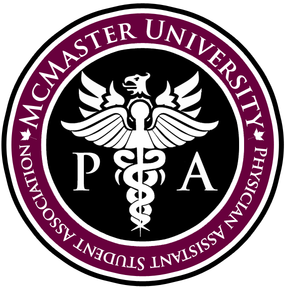Typical Weekly ScheduleThere is variation from week to week in PA school. In a typical week you will have tutorial on Mondays and Thursdays (time depends on instructors), IER on Tuesday mornings, every other Wednesday morning is Professional Competencies and once a month on Wednesday morning is Communications. There are placements and large group lecture-style sessions added into the schedule as well.
A brief description of what each of your classes, placements, exams are can be found below. For more detailed descriptions of your exams/evaluations please see the Evaluations section of this site. |
Tutorial:
Interviewing, Examining and Reasoning (IER):
IER Placements (Mandatory):
Communications
Professional Competencies:
Longitudinal Placements (LP):
CRE (Clinical Reasoning Exam):
PPI:
Anatomy Lab (Not mandatory):
MD Lectures (Not mandatory) :
Interprofessional educational events (PIPER) (Not mandatory):
MISC Events :
- Group based learning where student discussion and teaching occurs based on objectives which are formed from patient cases.
- i.e: 65 year old female patient presents with a lump in her right breast.
- Objectives then would be based on breast cancer and the anatomy and physiology of breast.
- Read more about Problem Based Learning
Interviewing, Examining and Reasoning (IER):
- Class where clinical skills including history taking and physical exams are acquired. ( ie: cardio exam, respiratory exam, abdominal exam etc.)
IER Placements (Mandatory):
- Half-day placements organized by the PA Program Office and can be scheduled on any day of the week where no Communications or Professional Competencies classes take place
- Placements are in hospitals and clinics for students to observe an area of medicine that reflects what is being studied in tutorial and IER (eg. during the Cardiology Unit, students spend one half-day at Heart Investigation Unit)
- Placement locations are in Hamilton but can be out of the city as well
Communications
- Occurs monthly
- Develops skills in patient interactions and how to deal with various patient scenarios; each week students will work with simulated patients (SPs) and have to work through various topics with the SP (e.g. breaking bad news, motivational interviewing, angry patient, etc.)
Professional Competencies:
- Occurs biweekly
- Cover topics such as medical ethics, the Ontario and Canadian health care systems, relevant policies and legislation in health care, and the role of a PA in the Ontario and Canadian health care system
Longitudinal Placements (LP):
- The student organizes observerships in domain of their choice to gain relevant clinical knowledge in that area of medicine
CRE (Clinical Reasoning Exam):
- This is an exam that tests the knowledge gained in tutorial. This occurs 6 times a year.
PPI:
- Exam comparing students’ progress to that of other students in the PA or MD program.
Anatomy Lab (Not mandatory):
- It is the responsibility of the students (as a group) to organize lab time with the assigned anatomy instructor; it is also the student's responsibility to determine what is wanted to be covered during this time
- Students are welcome to go into the lab at anytime for individual study
MD Lectures (Not mandatory) :
- Weekly lectures given by doctors covering topics being discussed in tutorial
- These are run by the medical school but are open to PA students; old lectures can be found online via medportal, but be aware that not all lectures are recorded
Interprofessional educational events (PIPER) (Not mandatory):
- Program for Interprofessional Practice, Education and Research
- Workshops enhancing health care practitioner collaboration in work place
- These are schedule at various times throughout the year and cover a wide variety of topics
- For more information on PIPER and their events please visit their website
MISC Events :
- McMaster Interprofessional Student Collaborative
- Workshops enhancing health care practitioner collaboration in work place
- To find out more about MISC please visit their website
Last Updated: November 2014 by S.Vuong
ABOUTMPASA is the Student Association for McMaster's Physician Assistant Education Program in
Hamilton, Ontario, Canada. |
LINKS |
Disclaimer: The opinions expressed on this website are those of the author, and they do not reflect in any way those of the institutions to which they are affiliated.


